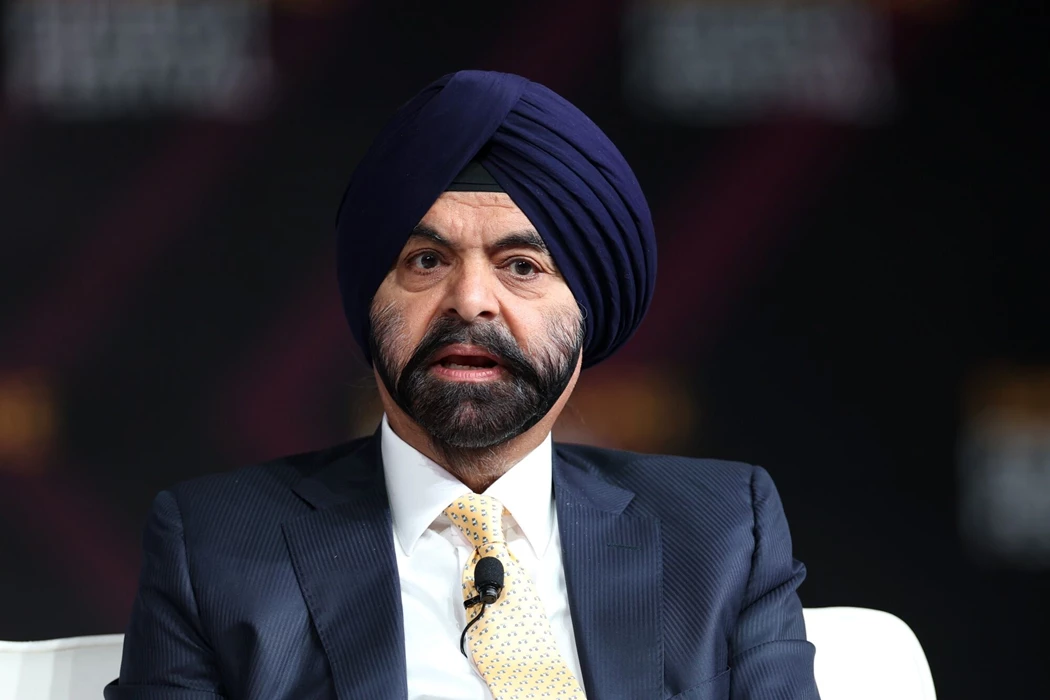New World Bank Chief Hails COP Momentum as Climate Pledges Mount
(Bloomberg) --
Six months after becoming president of the World Bank, Ajay Banga is seizing all the momentum he can at COP28.
World leaders spent the first three days at the climate conference unveiling a string of announcements from cutting methane emissions to ramping up the flow of money to poorer countries. The World Bank has been involved in many of those deals.
“There is a lot of energy,” said Banga in an interview in Dubai on Sunday. “There seems to be political alignment. I’m going to take all the tailwind I can get.”

The World Bank has for years struggled to mobilize the vast sums of money needed to help the developing world adapt to climate change and transition to renewables. Critics have said it has been too slow to get cash out the door and too focused on country-specific lending rather than addressing broader challenges like climate change.
Banga, who was nominated by US President Joe Biden, was put in charge to change that. The former chief executive of Mastercard Inc. last week raised the bank’s target for climate lending to 45 percent of its financing by 2025, up from its previous goal of 35 percent. He wants half of it to help countries adapt to the ravages of rising temperatures and the other half to help them fund their transition to renewable energy.
Asked about his first COP, Banga said “I’m most proud of the 45% as it’s putting $40 billion to work every year.”
A key part of Banga’s mission is to work with the private sector to unlock billions of dollars. Speaking at the Bloomberg Business Forum on Sunday, he said he’s working with a club of 15 bankers to lower the risk of investing in climate projects and attract capital. The World Bank has also stepped up action on other fronts, including allowing some vulnerable countries to potentially pause debt repayments, hosting a loss and damage fund for climate damages and supporting the COP Presidency’s methane push by helping countries like Vietnam and Indonesia address emissions in agriculture and waste management.
However, the problem that most intrigues Banga is carbon markets. He’s keen to restore credibility in the much-criticized sector as a way to channel money to poorer countries, especially given how hard it will be to implement carbon taxes around the world. The World Bank wants to sponsor forestry projects in 15 countries over the next 18 months in a push that could generate 125 million carbon credits. If priced at $20 per credit, that would amount to $2.5 billion for the participating communities.
The goal, he said, is to create a virtuous circle that will bring more people into the market.
“You need prices to go up and more credits to kick in,” Banga said. “It will be hard. It will be challenging but if we don’t do it, who will try?”
Challenges remain. Restoring faith in carbon markets will be fiendishly difficult and it’s almost inevitable mistakes will be made, he said. The bank is notoriously bureaucratic and Banga accepts that it will be difficult to speed up the flow of lending out of the bank. And there are still many questions hanging over one of the most eye-catching announcements at COP — how the newly established loss and damage Fund will actually work.
The darkest shadow hanging over this COP is the prospect of Donald Trump returning to the White House in 2025. The war in Ukraine has already prompted a dash for fossil fuels as countries fret about energy security and the cost of living crisis has prompted many countries to roll back their net-zero commitments. With polls showing that the former president running neck and neck with Biden, the concern is that all the progress made at this year’s COP will eventually be upended.
Banga said he’s focused on the here and now.
“I never worry about something like that, said Banja. “I control what I can control. What’s the point?”
©2023 Bloomberg L.P.
KEEPING THE ENERGY INDUSTRY CONNECTED
Subscribe to our newsletter and get the best of Energy Connects directly to your inbox each week.
By subscribing, you agree to the processing of your personal data by dmg events as described in the Privacy Policy.
More renewables news

With Trump Looming, Biden’s Green Bank Moves to Close Billions in Deals

GE Vernova Expects More Trouble for Struggling Offshore Wind Industry

Climate Tech Funds See Cash Pile Rise to $86 Billion as Investing Slows

GE Vernova to Power City-Sized Data Centers With Gas as AI Demand Soars

Longi Delays Solar Module Plant in China as Sector Struggles

Australia Picks BP, Neoen Projects in Biggest Renewables Tender

SSE Plans £22 Billion Investment to Bolster Scotland’s Grid

A Booming and Coal-Heavy Steel Sector Risks India’s Green Goals

bp and JERA join forces to create global offshore wind joint venture
















